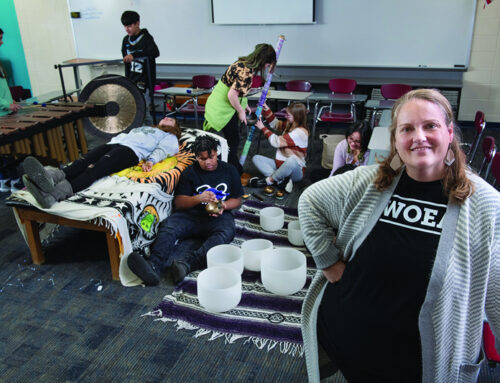Meet four midwives dedicated to evolving the Black maternal landscape
MESSA partner Ovia Health worked with the National Birth Equity Collaborative to compile these four stories of midwife trailblazers.
Shafia Monroe: Planting the seeds
Shafia Monroe Consulting
Portland, Ore.
As these spotlights featuring Black doulas and midwives were being prepared, one woman kept coming up as a source of inspiration and motivation. That woman was Shafia Monroe, who MadamNoire magazine named “Queen Mother of a Midwife Movement” for her pioneering work in her hometown of Boston.
Monroe has been a midwife for 40 years, has led SMC Full Circle Doula Birth Companions for 20 years, spent 19 years as a doula trainer, and has a master’s of public health.
At 17, Monroe learned Black babies were dying at two and a half times the rate of white babies and decided to dedicate herself to midwifery. Her work has since become a true example of social responsibility, activism through birth care and dedication to empowering her community.
“I choose midwifery as an act of self-determination, to reclaim Black birth traditions and postpartum rituals, to support families and build community, and continue the legacy of the 20th century African American midwife, who was a pillar in her community.”
Her organization helps midwives and doulas through rigorous, culturally based training to support a new generation of birth care workers.
Monroe cites her parents, Harriet Tubman, the Black Power Movement and her faith as her most precious inspirations.
“I educate Black families on the history of Black birth and newborn customs, discuss high-quality African-based diet for health, teach patient rights, tell them to use midwifery care, doula support, home birth, birth centers, and be fearless and enjoy their pregnancy. I am a mother of seven children, six home-births, and one hospital birth. It taught me children are our future and gifts to be treasured, and pregnancy and birth for me were enjoyable, and I loved all of it.”
And these inspirations have helped drive her forward in her mission to effect change and ensure that, as she states, “Black women and their families are treated with equitable health care to prevent unnecessary deaths from pregnancy.”
Monroe, a self-described lover of life and people, considers the whole birth care journey in her practice. She is publishing a book on postpartum foods for the Black community that taps into her passion for cooking, organic gardening and making herbal tonics.
Asasiya Muhammad: A clear vision for the people
Inner Circle Midwifery
Philadelphia, Pa.
Asasiya Muhammad calls herself the “people’s midwife,” which informs the intentionality of her birth work and her dedication to following and expanding her practice.
“My training was at a high-volume birth center on the El Paso/Mexico border, so I learned and practiced midwifery almost 100% in Spanish for two years,” Muhammad says.
This experience solidified her love for the practice.
Assisting in more than 600 births for 11 years as a doula and now a midwife has allowed Muhammad to witness a transformation in many of the families she has supported, 300 of which were her primary clients.
“The most inspiring encounters with families are seeing parents transform over the time we initially meet to the moment that they first meet their baby. They are often a bit nervous in the beginning, and when the birth has happened — all of the doubt they may have held quietly is dispelled. The mother, in particular, glows in her own power.”
For Muhammad, restorative justice for Black people is especially critical in how they enter this world. A mother of five children, she has first-hand experience of feeling neglected and unrepresented by health care providers. Her experience as a mother has helped her understand how important it is to feel safe and trusting during a birth. She thinks that a person’s sense of agency affects how the process will unfold and even how they bond with the life they have created.
When it comes to Black maternal health, access to midwifery education and care is key to positively impacting the birth experience and health outcomes for Black families.
“This looks like midwifery schools prioritizing women from underserved communities for scholarship and grant opportunities,” she says. “I’d also like to see midwifery care accepted as a legitimate and ideal model for maternity care in the United States, as it is in most other places throughout the world. With that change, we can persuade states to offer licensure to all credentialed midwives and create a path for all licensed midwives to be covered under insurance.”
Authentic connection is critical to Muhammad when engaging with new clients. She wants to know and understand all the important things to them — where they find strength and feel most vulnerable — and address clinical, physiological and emotional issues. She actively engages in peer review while continuing her training and education. She cites her clients’ needs as a source of that continued training, noting areas of adjustment and innovation to improve the quality of care for them and all the other families to come later.
Muhammad graduated with honors from Temple University with two majors, a minor in Strategic & Organizational Communication and African-American Studies, and a concentration in Political Science.
Lodz Joseph: Helping families steer their course
Albany, Ga.
Every day, Lodz Joseph brings her board-certified skills as a midwife to the people of Albany. She describes the rural city as a maternity care desert, where access to maternal health care services is limited or absent for many residents. As part of a local women’s health center team, Joseph has connected with more than 350 families in their birth process.
As she traveled toward certification, Joseph made connections that continue to inspire and motivate her.
“Black midwives have been my support and my mentors,” Joseph said. “People such as Trinisha Williams, president and founder at Haven Midwifery Birthing Center in Brooklyn; or Dr. Nikia Grayson and the work she is doing in Memphis as part of the Choices: Memphis Center for Reproductive Health.”
She finds that their passion for the work helps reaffirm her choice of being a birth care provider, “that these dreams I have are totally not crazy.”
Joseph focuses on creating a customized experience for each patient and family she encounters, which she feels can create more positive outcomes for Black, Latinx, Indigenous and LGBTQIA communities.
“We don’t need old models of maternity care. You must adapt precautional care to the person in front of you, and it should have a local flavor.”
Tailored care approaches that consider the individual, location and community are essential for Black maternal care.
“Safety is the minimum,” she says, and while the baseline of care must move beyond that, safety should be the starting point.
This is especially important to Joseph as she is expecting her own child.
“I want it to be safe,” she said. “I want to go into spaces and not feel like l don’t belong. I am tired of using so much energy to be heard. I don’t want to feel like I have no other choice. … I want to show as a birthing midwife that you have real choices.”
Joseph encourages women of color to fight for their maternal care choices. Regardless of the birth setting, each individual should feel empowered to steer their birth journey because true reproductive justice is built on the patient’s choices. It’s built on the knowledge that all birthing people look different, on real access and information, and on the right to be seen and heard.
Aiyana Davison: Generational winds under her caregiving wings
The Vagina Chronicles
Southern California
Wanting to help others, Aiyana Davison had initially set her sights on becoming an OB-GYN and began her first year in medical school. However, she quickly realized that the reality of the field did not align with how she wanted to help families in their birth journeys.
Determined to reach her goal by other means, Davison came across nursing and midwifery — an ironic option since she comes from a family of nurses. It was not until her grandmother died that she discovered that the woman who came from Antigua to become a registered nurse in the United States, bringing her entire family, was once a midwife back on the island. This caregiving theme has woven itself across generations of Davison’s family.
Like many midwives, she has a full plate. In the past five years, Davison attended 1,000 births. Yet, despite all she has been able to do as a midwife, she knows that so many changes are still needed for Black women’s maternal health.
“One of my personal passions is decreasing the secrecy. For so long, we have kept quiet. If you look at the history of Black women, there is a reason why that’s done. If you say too much, you could get killed as an enslaved person.”
As Davison sees it, Black women need to talk to each other more about health matters, especially among families where one person’s history can help another woman understand the challenges she may face.
“Some of us are suffering when we could all be healing together,” she says.
Black women need to be listened to and supported in exerting their power, Davison says. In addition, they need to demand to be informed and educated about and drive their maternal care process.
Davison’s cousin, a fellow midwife who passed away recently, spoke to her about the power of letting the moment be and submitting to the birth process.
“Shortly after hearing that story, I was at a birth, and I took a moment to stop,” Davison says. “All I could hear in my head was what my cousin shared about waiting. So I said, ‘Let’s just wait,’ and as soon as the words left my lips, the mother’s bag of water broke, the baby started to come out, and everything fell into place.”
Through that experience, Davison learned anew to trust those who come before you to teach what they have learned.
“That moment was an affirmation for me,” she says. “That … the thing we need to happen will happen. We just need to give it the time it deserves.”
A constant learner, Davison cites her mom as her greatest inspiration, and she leans on her and her fellow midwives to move forward in her caregiving journey.
The National Birth Equity Collaborative creates solutions that optimize Black maternal and infant health through training, policy advocacy, research and community-centered collaboration.






